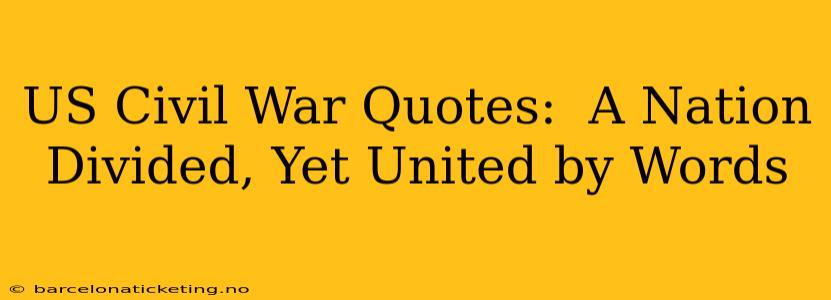The American Civil War, a brutal conflict that tore a nation apart, left behind a legacy etched not only in blood and battlefields but also in words. The quotes from this era—from presidents, generals, soldiers, and even everyday citizens—offer profound insights into the hopes, fears, and ideals that fueled this tumultuous period. These weren't just words; they were the battle cries, the pleas for peace, and the reflections on a nation grappling with its own identity. This exploration delves into some of the most impactful quotes from the US Civil War, examining their context and lasting significance.
Key Quotes That Defined the Era
The Civil War's legacy is inextricably linked to its powerful rhetoric. Let's examine some of the most memorable quotes:
"A house divided against itself cannot stand." - Abraham Lincoln, 1858
This quote, from Lincoln's famous "House Divided" speech, perfectly encapsulated the nation's precarious state before the war. He wasn't simply referring to the political division over slavery; he was highlighting the fundamental moral and philosophical rift threatening the very fabric of the Union. The quote's enduring power lies in its timeless applicability to any society facing internal conflict.
"Four score and seven years ago our fathers brought forth on this continent, a new nation, conceived in Liberty, and dedicated to the proposition that all men are created equal." - Abraham Lincoln, Gettysburg Address, 1863
Lincoln's Gettysburg Address, delivered during the midst of the war, is arguably the most famous speech in American history. This opening line, referencing the Declaration of Independence, re-centered the war's purpose around the founding ideals of equality and liberty. It framed the struggle not just as a political battle but as a fight to uphold the nation's founding principles. The brevity and power of this quote are a testament to Lincoln's masterful oratory.
"It is well that war is so terrible, we should grow too fond of it." - Robert E. Lee
General Robert E. Lee, commander of the Confederate Army, understood the horrors of war firsthand. This reflection reveals a grim awareness of war's destructive potential, a sentiment often overlooked amidst the glorification of military leaders. It speaks to the immense human cost and the need to prevent future conflicts.
Exploring the Voices of the Civil War
Beyond the well-known figures, numerous other voices contributed to the rich tapestry of the era. Letters, diaries, and speeches from soldiers, abolitionists, and civilians provide crucial perspectives:
What were some common sentiments expressed by soldiers during the Civil War?
Soldiers' letters and diaries often reveal a complex mix of emotions—patriotism, fear, longing for home, and profound disillusionment with the war's brutality. Many expressed a deep sense of duty and commitment to their cause, while others questioned the war's purpose and suffered from immense psychological trauma. These personal accounts offer a humanizing counterpoint to the grand narratives of military strategy and political maneuvering.
How did abolitionist rhetoric influence the course of the war?
Abolitionist leaders like Frederick Douglass employed powerful rhetoric to condemn slavery and advocate for emancipation. Their writings and speeches played a significant role in shaping public opinion both domestically and internationally, putting immense pressure on the Union government to embrace a more decisive anti-slavery stance.
What were some of the key differences in the rhetoric used by the Union and the Confederacy?
The Union's rhetoric often centered on preserving the Union and upholding the principles of liberty and equality. The Confederacy, on the other hand, emphasized states' rights, self-determination, and the preservation of their way of life, which was deeply intertwined with the institution of slavery. These differing narratives shaped the war's ideological battleground and ultimately influenced its outcome.
The Enduring Power of Words
The quotes and rhetoric of the US Civil War continue to resonate today. They serve as reminders of the fragility of democracy, the devastating consequences of conflict, and the enduring power of words to shape history, inspire action, and ultimately, define a nation. Studying these quotes allows us to connect with the past, understand the present, and strive for a more peaceful future. The Civil War's legacy is not merely in the battles fought, but in the words that reflected the hopes, fears, and ultimately, the profound transformation of a nation.

